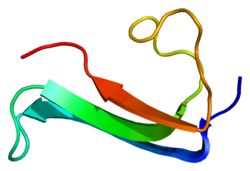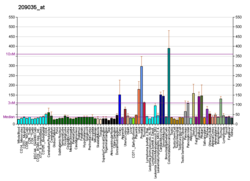Midkine
Le midkine est une protéine dont le gène est MDK situé sur le chromosome 11 humain. Il est appelé également NEGF2 (pour « neurite growth-promoting factor 2 »).
Rôles
[modifier | modifier le code]Il s'agit d'un facteur de croissance pouvant se fixer sur l'héparine.
Au niveau vasculaire, il augmente l'expression de l'interleukine 8[5]. Il favoriserait la formation d'un néo-intima après une angioplastie[6], première étape théorique de la resténose. Il intervient également dans la migration de cellules inflammatoires après une atteinte de type ischémique[7].
En médecine
[modifier | modifier le code]L'élévation de son taux sanguin est en cours d'étude comme marqueur de l'inflammation de l'athérome[8].
Notes et références
[modifier | modifier le code]- GRCh38: Ensembl release 89: ENSG00000110492 - Ensembl, May 2017
- GRCm38: Ensembl release 89: ENSMUSG00000027239 - Ensembl, May 2017
- « Publications PubMed pour l'Homme », sur National Center for Biotechnology Information, U.S. National Library of Medicine
- « Publications PubMed pour la Souris », sur National Center for Biotechnology Information, U.S. National Library of Medicine
- Sumi Y, Muramatsu H, Takei Y, Hata KI, Ueda M, Muramatsu T, Midkine, a heparin-binding growth factor, promotes growth and glycosaminoglycan synthesis of endothelial cells through its action on smooth muscle cells in an artificial blood vessel model, J Cell Sci, 2002;115:2659–2667
- Horiba M, Kadomatsu K, Nakamura E et al. Neointima formation in a restenosis model is suppressed in midkine-deficient mice, J Clin Invest, 2000;105:489–495
- Sato W, Kadomatsu K, Yuzawa Y et al. Midkine is involved in neutrophil infiltration into the tubulointerstitium in ischemic renal injury, J Immunol, 2001;167:3463–3469
- Ibrahim NE, Januzzi JL Jr., Magaret CA et al. A clinical and biomarker scoring system to predict the presence of obstructive coronary artery disease, J Am Coll Cardiol, 2017;69:1147–1156





